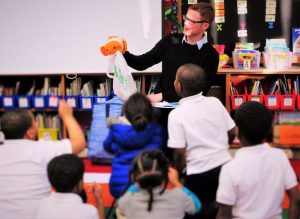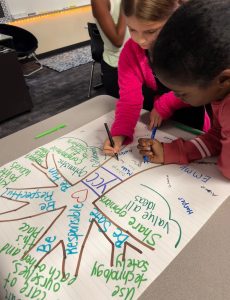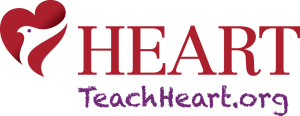
HEART (Humane Education Advocates Reaching Teachers) is a national nonprofit that equips educators and empowers youth through free, award-winning humane education programs focused on animal protection, environmental preservation, and social justice. With a special emphasis on under-resourced communities, HEART helps students develop empathy, leadership, and problem-solving skills while designing real-world service projects that benefit their schools and neighborhoods.
Vision
At HEART, we believe young people deserve an education that enables them to become agents of meaningful change. Our programs are grounded in the conviction that our youth must possess the skills and knowledge to become effective stewards of our natural world and passionate guardians of the rights and needs of all that share that world with us. We believe that when students are given the tools to explore complex social and environmental issues and the support to lead real-world solutions, they rise to the challenge with creativity, compassion, and courage.
History
HEART was founded in 2001 to fill a critical gap in education by connecting animal protection, environmental preservation, and social justice in one cohesive, values-based curriculum. Launched in New York City, HEART quickly grew into a national leader in humane education, delivering free programs that foster empathy, ethical thinking, and civic engagement among youth. Through partnerships with schools, after-school programs, and community organizations, HEART expanded nationally, reaching more than 100,000 students to create a more compassionate and just world. Independent evaluations have confirmed the positive impact of HEART’s approach, particularly in underserved communities, with a powerful mission to inspire the next generation of changemakers.
Vision for the Future
HEART’s bold goal is to reach 200,000 students and 26,000 educators by the end of 2026. In a world that urgently needs bold solutions and empathetic leaders, HEART is not just encouraging the next generation to envision a more humane future—it’s empowering them to build it.
Humane Education is…
 ANIMAL PROTECTION
ANIMAL PROTECTION
Cultivating compassion, respect, and knowledge to reduce animal cruelty and promote positive relationships between animals and people.
 SOCIAL JUSTICE
SOCIAL JUSTICE
Fostering empathy, kindness, and understanding to empower youth to face intractable problems and create a more just and inclusive society for all.
 ENVIRONMENTAL ETHICS
ENVIRONMENTAL ETHICS
Inspiring inquiry, reverence, and responsibility to encourage students to strive for a sustainable society, while protecting natural resources and the environment.
Activities
Students: Service Learning Projects
Compassionate Communities Awards (In-School Program)
HEART’s signature in-school initiative provides a robust framework to empower students as compassionate leaders. We offer themed curricular materials, ongoing educator support, and up to $1,000 in microgrants, dependent on available funding, to fund student-led service-learning projects.
Compassionate Communities Award emphasizes food justice as a powerful and accessible entry point for students to engage with complex issues. Food justice is not merely about providing meals; it’s about ensuring every person has equitable access to healthy, affordable, and culturally appropriate food. This approach allows students to explore and address real-world issues, such as why some communities are food deserts while others have ample healthy options.
By focusing on food justice, our program connects to a range of critical themes:
-
- For Students: It empowers young people to become changemakers in their own neighborhoods, promoting empathy and civic responsibility.
- For Communities: The program fosters sustainable food systems that support local economies, improve public health, and strengthen community bonds.
- For the Planet and Animals: Students learn how their food choices and local food initiatives can directly combat climate change, reduce waste, and promote biodiversity and humane treatment of animals.
- This integrated approach equips students with the skills to address interconnected challenges, making them more informed and compassionate leaders.
Our dedicated staff works in partnership with schools to ensure success. We provide regular consultations, sharing new ideas, activities, and curated resources. This support also includes connecting schools with specialized partners and providing a library of high-quality, pre-vetted educational materials.
The microgrants are a crucial part of this process, giving students the resources they need to bring their creative projects to life, whether it’s for events, materials, or other innovative ideas. We help transform student compassion into tangible, impactful action.
To work with HEART, apply to be a Compassionate Communities school, first email jeannie@teachheart.org for an initial consultation and to receive an application. Once accepted as a Compassionate Communities school, you work with our team to determine the size, scope, and direction of your project. Individual schools, grade levels, and classes can apply
Upon completion of their service learning projects, students present their work through multimedia showcases that promote learning beyond the classroom. For the past four years, CCA has focused on food justice, engaging over 10,000 students in 16 schools in 2024–25 in projects like hydroponic farming, cooking classes, and native habitat restoration. The program includes Title I and District 75 schools and emphasizes whole-school engagement through family events and public showcases. HEART’s status as a NYC Public Schools approved food education provider has expanded its reach and credibility.
Examples of Service Learning Projects:
- organizing a drive for food and equipment for a local animal shelter
- creating a Public Service Announcement and presentation on ocean pollution and how to work to clean up local waters and shores
- advocating for a local dog park through letters to local officials
- encouraging local bodegas to offer more whole, fresh foods at affordable prices.
- revitalizing an abandoned garden, built raised beds, and grew produce with a do-it-yourself method of hydroponic gardening using recycled bottles. Their hydroponics tower enabled a lettuce giveaway for staff and parents.
- hosting a Food Justice/Community Table event showcasing student-grown foods and powerful student-led presentations on food deserts and plant-based nutrition, marketing of fast foods, and healthy culturally affirming food choices that reduce dependence on corporate agriculture. The event drew wide community participation including local officials.
- engaging in deep learning around food justice and launched a successful family plant giveaway event, distributing hundreds of vegetable seedlings to promote home gardening. The project partnered with a local nonprofit employing teens to grow food for underserved communities.

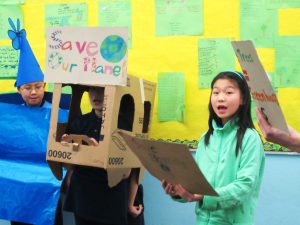
Youth Changemaker Clubs (YCCs)
Offered in flex time or out-of-school settings, YCCs are youth-led and mentor-supported. Students identify issues they care about, such as animal welfare, climate justice, and biodiversity loss. Then they lead the development of advocacy or service projects. Each club receives up to $250 in support. One highlight of many outstanding projects includes:
Advocating for Orcas in Captivity: At Schluter Elementary, YCC members explored ethical concerns around captive orcas. They launched a local awareness campaign and created a “living wax museum” portraying animal advocates. This club also leveraged the media to draw attention to their issue, drawing attention from a French politician in opposition to orca transfers.
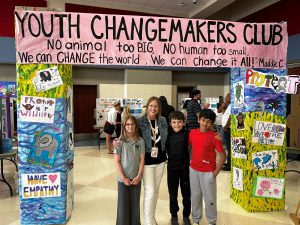
Audience Served
- Students :Pre-K–12 students are engaged through in-school, after-school, and summer initiatives. (see “Activities”)
- Educators: HEART offers free curricular support through its extensive online library of educational resources. These resources are available to a wide range of K-12 instructors in U.S. schools, youth organizations, summer camps, and community groups.
In addition to free resources, HEART provides teacher training and professional development opportunities. Instructors can apply to be part of our Youth Counselor Certification (YCC) or Compassionate Classroom Alliance (CCA) programs to receive specific training.
- Youth Workers: After school providers and volunteer youth leaders also can leverage free curricular support through our online library and can app;ly to participate in our Youth Changmeaker Clubs.
- Parents: Our free online library has resources helpful for parents including: webinars, videos to help parents offer learning opportunities at home, virtual games and activities for kids, and a curated list of books that helo address various topics through a humane lens. Parents can also apply to start their own YCC to help create community and humane opportunities for their children and their peers.
Successful Impact
HEART’s programs deliver measurable outcomes that foster empathy, leadership, and civic engagement. Independent evaluations by Fordham University and CUNY Staten Island found that students in HEART programs show significant gains in prosocial behavior and confidence, while educators report improved critical thinking and leadership skills.
In 2024, HEART was selected for the competitive Youth INC Metrics Program, an accelerator supporting youth-focused nonprofits. Through this initiative, HEART received training and a scholarship to implement Hello Insight, a nationally recognized tool grounded in Positive Youth Development and Social and Emotional Learning (SEL). Staff and volunteers administered pre- and post-surveys across program sites to assess impact. The results were compelling:
Our in-class programs boast
-
-
- 100% of students reported satisfaction with the program
- 100% of students showed growth in at least one SEL capacity (academic self-efficacy, mastery orientation, self-management, and/or social skills)
- 71% improved in two or more SEL areas
-
Our Youth Changemaker Clubs Report
-
-
- 100% expressed satisfaction with the program
- 88% of young people demonstrated gains in at least one SEL capacity and 72% succeed in 2 or more capacities!
- This group is developing Core SEL at a greater rate than 75% of all other similar groups
-
Hello Insight’s real-time reporting and youth-centered design has enhanced HEART’s ability to measure success and refine programming. These insights are driving continuous improvement, helping HEART deepen its impact and scale with integrity. The capacity built through Youth INC ensures HEART can demonstrate and grow its effectiveness—empowering more young changemakers with the skills to lead with compassion and purpose.
We receive testimonials about HEART’s programs and the valuable impact on the school experience:
“The kids are amazed by the injustices like factory farming, child labor, deforestation, plastic pollution, and climate change. They were inspired to take action by doing their own independent research projects, learning about the issues, asking questions about the unfairness of what is happening and brainstorming solutions to societal problems.” - NYC Teacher “HEART has developed invaluable traits and critical thinking within student participants while fostering a visibly deep respect and love for other people, animals, and the environment.” - YMCA Chicago Senior Director “There aren't many people who come to me and talk to me about compassion and caring...My takeaway is that no matter how big or small the action, it can make a big difference. I want to be a part of that difference." - NYC Ninth-Grade Student “Imagine if you do this every year and soon it’s in every school around the world!” - Fourth- Grade Youth Changemaker Club (YCC) Member “No animal too big. No human too small. We change the world. We can change it all.” -Fourth- Grade Student, Texas
Recommendations for Replication and Adaptation
HEART offers an adaptable, accessible model that schools, after-school programs, camps, and community organizations can replicate to promote youth-led civic engagement and compassion-based learning. Reach out to HEART: kristina@teachheart.org to see about starting a CCA or YCC in your community. To support implementation, HEART provides a robust and growing suite of free, high-quality resources and support tools and training, including:
- A Curriculum Library with over 200 free lessons, student activities, and reproducible worksheets spanning food justice, animal protection, environmental preservation, and climate change available through HEART’s website, on TeachersPayTeachers, and Pinterest, and Seesaw.
- Implementation Toolkits and Training Guides that walk educators and youth leaders through every stage of launching a project, whether for a single class or a whole school.
- The Certified Humane Education Specialist (CHES) Program, a hybrid professional development course for educators, with scholarships available for teachers from Title I schools and under-resourced communities.
- Consultation to help schools and nonprofits customize program delivery based on student needs, school size, and community priorities.
- Tips: Whether you’re an educator, after-school provider, or community leader, here’s what we recommend to successfully bring Compassionate Communities Awards (CCA) or Youth Changemaker Clubs (YCC) to your setting:
- Start with Student Voice
Invite students to explore the issues they care most about, whether food insecurity, climate justice, or animal welfare. When students lead the way, engagement and impact soar. - Build a Supportive Adult Partnership
A caring adult, teacher, youth leader, or parent helps guide and mentor students through project planning and reflection. You don’t need to be an expert—just willing to learn and facilitate. - Use Our Free Tools
HEART offers a comprehensive Curriculum Library with over 200 free, standards-aligned lessons, digital slide decks, editable worksheets, and asynchronous video modules to help you hit the ground running. - Tap Into Implementation Resources
Access our toolkits, training guides, and CHES professional development program (with scholarships available) to build confidence and capacity in delivering humane education. - Apply for Microgrant Support
Reach out to HEART: kristina@teachheart.org. Accepted schools may be eligible for up to $1,000, and each YCC club can access $250 in seed funding to support student-led action projects—from gardens and giveaways to awareness campaigns and community events. - Plan for Multi-Level Engagement
Successful programs often include family nights, showcases, and partnerships with local groups. Encourage students to think about who else in their school or neighborhood can be part of the solution. - Prioritize Reflection and SEL
HEART uses tools like Hello Insight to assess social-emotional learning (SEL) growth and student leadership. We encourage program leads to embed regular check-ins and reflection moments throughout the journey. - Adapt to Your Community
Our programs are flexible and culturally responsive. Whether you’re working in an urban classroom, a rural after-school program, or a special education setting, HEART will help you adapt the content and approach to fit your needs. - Ask for Help. We’re Here for You.
HEART offers consultation and coaching for educators and organizations interested in bringing our model to life.
Websites: teachheart.org, teachheart.org/ycc, cca.teachheart.org
Curriculum Access: https://teachheart.org/library/
Contact Information:
Kristina Hulvershorn, M.Ed. (she/her), Program Director
H.E.A.R.T. (Humane Education Advocates Reaching Teachers)
(929) 244-9186
kristina@teachheart.org
Jeannie Russell, M.Ed., Service Learning Director
H.E.A.R.T. (Humane Education Advocates Reaching Teachers)
646-228-5274

